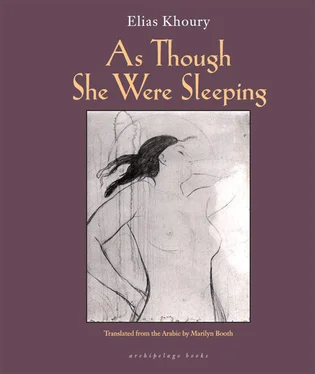After the death of her husband the mother contracted the chronic illness that obliged her to spend almost all of her time at the Convent of the Archangel Mikhail, in the company of prayers and icons and the nuns. As a grandmother she would become a saint or nearly so, eating nothing but bread and bringing cotton soaked in holy oil for members of the family who were ill. No one could ever claim they had not improved because of Saadeh’s sacred oil, because no one else would believe such a claim. All members of the family, big and small, old and young, believed in Saadeh’s miraculous presence. After all, the corpulent nun with the thin nasal voice had bestowed a special grace on Saadeh through their relationship.
The water and the morning briskness of Shtoura, creeping into Milia’s body, convinced her to return to the room. She went into the reception hall where the breakfast table was set. She saw the driver sitting alone at the table, stuffing himself with fried eggs, labneh, and cheese. When he saw her coming in from outside he rubbed his hands, gave her a sidelong look, and grinned. She saw the words hovering around his lips as if he wanted to talk but he went on chewing his food, exaggerating his lip movements in a show of mockery directed at her. Milia tiptoed up the stone stairs. She opened the door to the room where the drapes were still closed, immersing the place in darkness. She detected an odd smell, something like the smell of the lake in her dream, and felt sleepy. She took off her clothes, put on her nightgown, and got into bed next to Mansour, who was wrapped tightly in the sheets and curled into a half circle. Bringing her face almost to his closed eyes, she felt a rush of tenderness but along with it came an ache that swept from her shoulders to her tailbone.
Milia would not call it love. Here in this bed, and there in the car, she felt something undefinable, something imprecise whose name she would not discover until Nazareth. The word love she used only once, returning home from the church, her belly swollen and the fragrance of the incense filling her clothes. Mansour was in the garden smoking a cigarette and sniffing the scent of the earth awakened by the rain. He turned to her and said, You know, Milia, you’ll be giving birth on Christmas, at the end of December.
She was in her fifth month. The smell of the rain ushering in the month of September intoxicated her. She knew exactly when she would give birth to her baby, even to the hour. But when Mansour uttered the word Christmas she felt a shiver at her lower belly, as if the fetus were moving. She saw a white fog hovering around the eyes of her husband and remembered his closed eyes on that morning in the Hotel Massabki, and she said she loved him.
So, if you love me, great, then why don’t you let me sleep with you?
She put her finger on his lips to shush him. Why did he have to talk like that, using that phrase? She had told him a thousand times that she didn’t like to hear this sort of talk, and that sex was created for the sake of producing children, and now she was pregnant, and praise be to God.
Mansour began to talk and silence gripped her, as though she had put on a veil that muted her. She would walk through the house on tiptoe, keep everything neat and in order, make food, and wait for her husband. She never asked him questions; he could be out as late as he liked and come home when he liked, always confident that his wife would not complain or ask questions.
He talked to her about love. He told her how her beauty had completely enchanted him when he saw her for the very first time. She smiled and her eyelashes came down to hide her eyes. He said a lot of things, and then he said that marriage makes one thirsty.
Me too, I am always getting thirsty, she said.
He didn’t tell her why though. He was thirsty because she was silent, because he had to fill in the empty spaces that the absence of speech created. He didn’t ask her why she pretended to be asleep when he had sex with her. He knew that her body arched in pleasure, that her moans were not of pain or refusal. That quiet sound, something between a moan and a sigh, escaping her pressed-together lips, enflamed all of his pores and made him feel like a swimmer in the sea. He would wait until it was dark, close his eyes upon the colors of desire, and sail upward borne on a gentle rippling of waves, warm air enveloping him and inviting him to remain. As he finished, he felt his body sharpen with pleasure, whetting his appetite. He wanted more. But this woman of ever-closed eyes pressed her thighs together, coughed, and rolled away from him in bed, leaving him holding his sex as he crept into the bathroom.
This soft moan that came from her body, shaped and tinted by her dreams, returned him to the first moments of passion. He forgot that he had not succeeded in making love to her properly in Room Ten of that little hotel. His body had broken faith with him and he had felt himself on the edge of death. Walking through the fog for more than an hour; the stinging snow and ice that swirled over him in the storm; his fear that he would lose his footing and fall into the wadi; his awareness of his own manhood — all had overcome him. There inside the shroud of fog his manhood had strutted before him, confident, while he stumbled forward behind it, on the point of falling, his eyes wet and tingling. He wanted to close his eyes to stop the burning caused by the cold wet air. He looked back to see her but saw only the indistinct shape of the car inching forward turtlelike. When the driver got out of the car halfway up the slope of Dahr el-Baydar and said he could not go on and would take them back to Beirut, Mansour shouted at him and said he would drive the car himself. Whipping around to return to the car, he saw the driver scamper ahead to take his seat behind the wheel, gesturing to indicate that he would keep going, following him.
Fine, said Mansour, his words spiraling into the tempestuous wind and getting lost. But in this scene nothing was fine, and the route was full of dangers. He slipped several times and the car behind him was skidding too. As the fog began to break up he returned to the car to find Milia asleep, swathed in her mother’s overcoat, shivers running through her body. He tried to start a conversation with her. He wanted to recite poetry to her. He had prepared a good number of lines from his store of ancient Arabic poetry to recite as he drank champagne in the hotel room before taking this woman in his arms. But now he could only locate a few lines of popular verse.
The peaks of Lebanon! How shall one cross them
by winter when their summers are wintry?
Snows clothe their byways blinding my eyes:
A whiteness so pure only black can I see
The woman opened her eyes momentarily and closed them again. Had she not heard? Or perhaps she did not understand what she heard. Mansour felt defeated. For this woman who was his, he had been preparing the surprise gift of poetry. He had decided on love poems of the ancient poets as a fitting beginning. She would realize that indeed he was a poet in his own way, for he had memorized hundreds of lines; and for his wedding night alone he had assembled a lavish banquet of poems. He envisioned himself in the hotel room, drinking champagne as he strewed words across the floor. They would land at the feet of this woman who had stolen his heart and obliged him to spend so much time in transit between Nazareth and Beirut.
Mansour had not known, of course, that the passing encounter in the garden would turn his life upside down and convert him into a perpetual traveler. But, gazing into his hosts’ next-door garden, his eyes fixed on the fair-skinned girl, her long hair bound up in a ponytail, whose figure was bent over to water a pot of basil, and he went out of his mind. Mansour had come to Beirut on a buying trip, wanting to stock the dry goods shop he had opened recently in Nazareth. The dispute that had flared between him and his brother, Amin, over how to run the iron foundry in Jaffa they had inherited from their father had settled it: he would become an independent merchant. He was determined to start anew, somewhere else — but that would only be to start.
Читать дальше












